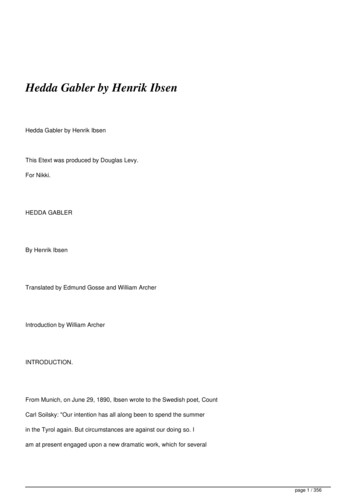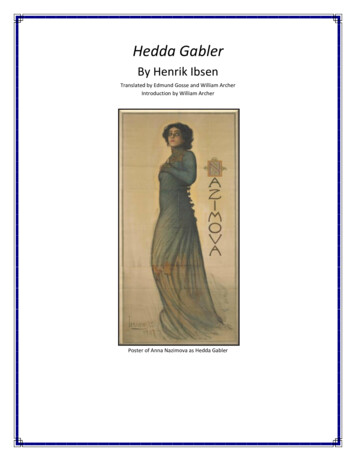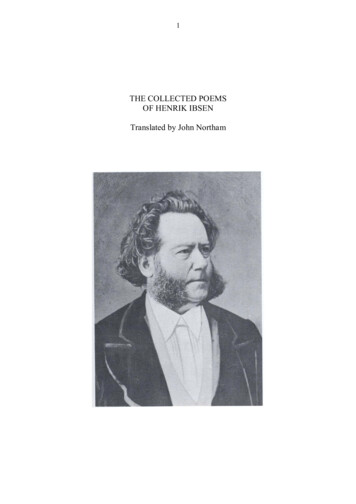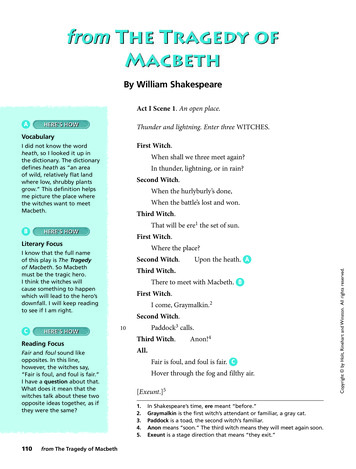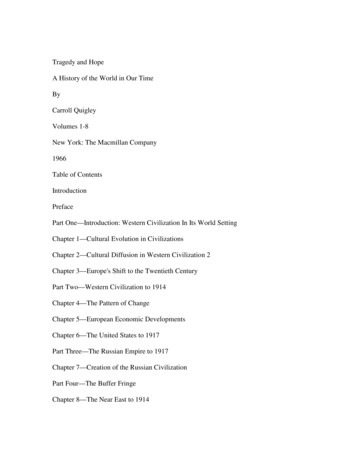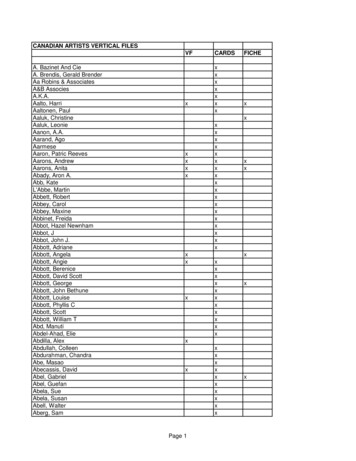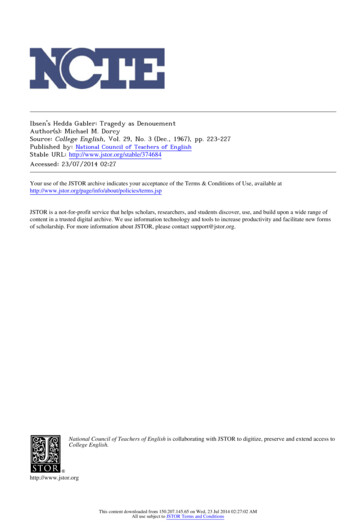
Transcription
Ibsen's Hedda Gabler: Tragedy as DenouementAuthor(s): Michael M. DorcySource: College English, Vol. 29, No. 3 (Dec., 1967), pp. 223-227Published by: National Council of Teachers of EnglishStable URL: http://www.jstor.org/stable/374684 .Accessed: 23/07/2014 02:27Your use of the JSTOR archive indicates your acceptance of the Terms & Conditions of Use, available at ms.jsp.JSTOR is a not-for-profit service that helps scholars, researchers, and students discover, use, and build upon a wide range ofcontent in a trusted digital archive. We use information technology and tools to increase productivity and facilitate new formsof scholarship. For more information about JSTOR, please contact support@jstor.org.National Council of Teachers of English is collaborating with JSTOR to digitize, preserve and extend access toCollege English.http://www.jstor.orgThis content downloaded from 150.207.145.65 on Wed, 23 Jul 2014 02:27:02 AMAll use subject to JSTOR Terms and Conditions
THECOMICASA CRITIQUEthan audience a comic butt because ofhis cowardice, with Maurice Morgann'sview that Falstaff is an admirable, thoughnot exemplary, character. The questionis important because of its bearing onthe theme of honor in the Henry IVplays. We might choose both views ofFalstaff, as most observers of our daywould, but such a choice is also a romantic reading that a consistent historicalcritic would deplore.I did not bring up this problem inorder to solve it, but I would suggestthat the solution depends on what kindof knowledge we are seeking. To knowthe pastness of the past requires historical knowledge and historical imagination; to know the presentness of thepast, which is the task of romantic criticism, requires even more. I am awareOFREASON223that the historical critic does not thinkthe greater comprehensiveness of romantic criticism a virtue, but for most purposes I believe that those who are interested in the relevance of the humanities will want to judge not only by thestandards of the past but also by thestandards which they believe in. Thebulk of criticism since 1800 (includingthat of Eliot, Hulme, and Leavis) hasbeen romantic, and I do not think wewould be creating better readers-or men-by suggesting that they stop sympawithFalstaff,Malvolio,thizingHarpagon, or Alceste. To me, it wouldseem a far more worthwhile critical taskin dealing with any comic character todetermine "how far, in many of hisnotions, he might, tho' odd, be absolutelyright."Ibsen's Hedda Gabler:Tragedy as DenouementMICHAEL M. DORCYPROFESSOR MAYNARD MACK,amongothers, has remarked that drama is anobvious, yet an often neglected, linkbetween literature and life, and this atall levels of education. Drama is a uniquetype of meeting, to borrow MartinBuber's term. It is not a real life encounter of two persons; rather, it is,or can be, a meeting with oneself in thetransparent other. This is especially trueof tragedy at its best. And it is especiallythe time element of tragedy, thatsense of the present, which controls theinvolvement one experiences in the muchdiscussed tragic enterprise.Michael M. Dorcy is in the Department ofEnglish at Saint Louis University. He is preparing a book on image media and other aspects ofpopular culture.Some time ago, Richard Chase criticized T. S. Eliot for what he chose tocall a "loss of the sense of the presentmoment in time and the sense of theworld about us, the sense of what ispresent."' Chase's citing of poets whomhe considers to have conveyed a "senseof the present" at least questions thesweeping indictment by some critics thatall poetic activity is basically romanticand therefore an ahistorical enterprise,an escape from time and time's stuff.The artist, it would appear, has anoption. This is especially evident in thedramatic or tragic arts; in these theartist can either side step or come to1Richard Chase, "The Sense of the Present,"Kenyon Review, VII (1945), 218-231.This content downloaded from 150.207.145.65 on Wed, 23 Jul 2014 02:27:02 AMAll use subject to JSTOR Terms and Conditions
224COLLEGEgrips with what Mircea Eliade has sotellingly called the "terror of history."Henrik Ibsen's Hedda Gabler is a fineexample of the handling of this alternative presented to the dramatist. For inthis play, variously described as tragedy,comedy, "dark" comedy, and tragicomedy, we find portrayed a struggleand a conflict with time itself, resultingin a final imbalance between the pastand the present which affects the basicrelationship between audience and protagonist, and ultimately prevents theplay from being real tragedy at all.The Dimension of Time:The Sense of the PresentDrama, even in its most primitiveforms, reveals a relationship of threebasic elements: a place, set aside for aspecific function, that of representation;a play-community, aware of itself as agroup and gathered for a distinct purpose; and an actor, confining himself tothe specified area, the stage, and in allhis concrete particularity enacting therepresentation for which the communityis gathered. About the sacred area thereis a willing suspension of the limitationsof time and space. The actor standspresent to the audience in an attemptto stop time and to enter into the fathomless profundity of a single human act.Through the action, the audience findsitself, and is in a sense restored to thehuman race.History as a chronicler's account ofthe future becoming the past, and asviewed from that end only, tends toproduce a certain stagnating, dehumanizing effect. This kind of history mustbecome myth before drama becomespossible. Myth is a passport out of thechronicler's history where reason is reduced to historical trend, and wherehuman heart is forgotten in the frigidrelating of fact. Through drama, in turn,man takes myth and restores the humanelement that has been lost. These arehuman beings performing an action andENGLISHthus myth becomes real history, historyas present. The audience has a glimpseof history at the moment it is beingcreated.Henrik Ibsen was consciously strivingfor the Aristotelean ideal of a dramaticaction transpiring within a single revolution of the earth about its axis. Butwhereas in the Greek theater the playwright had only to evoke a myth thatwas common property and could concentrate on his own present revelationof plot, Ibsen must weave the tissueof his own myth at the same time he isconcentrating on his action. The Greekplaywright could lift the entire mythinto his own presentation and make itreverberate in the present. Ibsen, unableto draw upon established tradition, mustreveal all that he would have his audienceknow about the past, and in doing sohe constantly runs the risk of losinghis presentation and letting it slip backinto the past.This aspect of Ibsen's dramaturgy receives some elucidation from WilliamArcher's discussion of the "point of attack" in Play-Making. Faced with thevast maze of the universe fabric, theplaywright unravels a single strand ofactivity; then he cuts it, arbitrarilychoosing a beginning. He can run thecurtain up whenever he wishes: at thestart of a crisis, or at the beginning ofthe catastrophe. Shakespeare's usualpractice was to bring the entire actioninto immediate purview, leaving little tothat narrative exposition which becomesthe chronicler's history and looses thehold on the present. In Hamlet, forexample, in the play-within-the-play, themyth is brought up to date, giving a newdepth to the present; the dead past becomes alive again.Ibsen's point of attack is always late.Only in the League of Youth and inAn Enemy of the People could one saythat his whole action comes from within the framework of the play. In otherpresentations Ibsen is forced to go backThis content downloaded from 150.207.145.65 on Wed, 23 Jul 2014 02:27:02 AMAll use subject to JSTOR Terms and Conditions
IBSEN'SHEDDAin order to put his audience in possessionof some of the antecedent circumstancesnecessary for an understanding of thepresent action. As his talent aged, Ibsenbecame more and more adept at avoidingcumbersome prologues. This he accomplished through such devices as theconfidant of the classic French theater.Yet the emphasis on the past remainedstrong, and as Archer remarks, Ghostsis a drama of exposition rather thana drama of action. Ibsen fails to strikeany "reasonable equilibrium between thedrama of the past and the drama of thepresent." In his last works the agingIbsen gave an upper hand to the past.In The Master Builder, Little Eyolf, JohnGabriel Borkman, and When We DeadAwaken, we find three-fourths of theaction dedicated to a "passionate analysisof the past."In Hedda Gabler Archer sees a more"sound proportion between the past andthe present." Yet the opening revelationbetween Miss Tessman and Bertha inthe conventional French mode, and theexpository tite-1-tte when Hedda firstencounters Thea, remain obvious structural weaknesses in the play. The pastis constantly encroaching on the present,and Hedda is threatened with beingcrowded off stage. She cannot, as Hamletcan, thrust herself forward and assumethe role of one whose deliberations aresteeped in consequences of eternalsignificance.The Dimension of FreedomThe present is a notion that makessense only to a being who is free; freedom is enjoyed only by one who cansay "now." The dimensionality of freedom in Hedda Gabler depends precariously on the time dimension attributedto all of Hedda's actions.Hedda is a person who, according toGabriel Marcel's distinction, has subjected being to having. She has exaggerated the receptive aspect of self andthe range of freedom, conceiving, asGABLER225Sartre does, of an antinomy betweenabsolute power and total subjection,ruling out the possibility of participatedfreedom. The man who subjects beingto having is never available to others.He can only see others as useful or notuseful for serving his own ends. Otherpeople must be appropriated. Insofar asthey exercise a bit of interiority themselves and do not submit totally to appropriation, they become living hells forsomeone like Hedda.Marcel insists that freedom goes beyond the Sartrean distinction betweenautonomy and heteronomy. It does notfollow, as Sartre pretends, and as Heddathinks, that because a person is not theplaything of his environs he is completemaster of himself.On Marcel's analysis, Hedda's suicidefollows consistently from her previousbehavior. Brack's astonishment at play'send betrays his shallowness: people,Hedda's type of people, do do suchthings! It is the final gesture of thespectator, the antithesis of the witness'smartyrdom. It is a refusal to offer testimony to transcendence, a refusal to say:"There are other beings with whom Imust exist, but whom I cannot 'have'to manipulate and control." Hedda, asone whose life has centered on having,regards suicide as the supreme act ofabsolute freedom. Blinded by the illusionof absolute power, she has turned againstherself. Ultimately, and in the simplestterms, Hedda's problem is an absoluteinability to say "we."Hermann Weigand (in The ModernIbsen) has described Hedda as the"quixotic heroine" and sees in her behavior signs of an "absolute concentration of her whole personality upona single act of willing." It is here thatwe put our finger on a vital elementin comprehending Hedda's character andultimately in relating that character tothe dimensionality of the tragic. For itis precisely her inability to concentrateher whole personality upon a single actThis content downloaded from 150.207.145.65 on Wed, 23 Jul 2014 02:27:02 AMAll use subject to JSTOR Terms and Conditions
226COLLEGEof will, whether for good or for ill,which keeps Hedda's actions on theperiphery, just skirting the fully tragic.Such a concentration of will is deniedHedda from the beginning of the play.There are three basic ways in whicha man can confront existence: He canyield to the beast that broods withinhim and confine his activity to a simpleresponse to his environment. Or, turninginto himself, he can chart and lay strictclaim to that meager half-acre we callourselves, and fend off all comers. Oragain, man can attempt to balance theextremes of living completely without orof living completely within. He can pickhis way along the precarious tightropethat lies between.He must chart his half-acre, but hecannot completely fence it off. He mustrespond to the "without," but not totally.Maintaining the avenue to the "within,"which is a sense of himself, he mustforage in the uncharted woods that surround him. Before he can live fully,he must, as Jacques Maritain says, assumethe ethical category of "existence with."This he must do before he can act foror act with.Hedda's plight, and it is a plight ofher own making, is the choice she hasmade of the hedgehog existence; selfenclosed and with spines alert, she fendsoff all comers. Or to use the figureClaudel employs to describe Mesa inPartage de Midi, she has so tightly sealedherself off that God himself would breakhis fingernails trying to pry her open.In his Range of Reason, Maritainspeaks of that initial act of choice, orwhat he chooses to call "the immanentdialectic of the first free act," when,however young or however beyond therecall of memory the act may be, theindividual, reflecting upon himself,chooses or rejects goodness as somethingin itself and thus comes to a decisionabout the "direction of his life." Thisdecision binds the future, but only ina fragile way. It does not necessarilyENGLISHconfirm one forever in a chosen path.But any deviation from that initial choicemust emanate from an act of freedomas deep and as deliberate as the originalelections.The extreme ideal found in some existentialism (notably the Sartrean variety)of the full commitment of oneself, or ofthe raw confrontation of naked willagainst the cosmos, places an impossibleburden on man and can only result infrustration. Flesh-bound and time-boundman is, "when found at best." And neveris he at one single moment all that hewould be
dom in Hedda Gabler depends precari- ously on the time dimension attributed to all of Hedda's actions. Hedda is a person who, according to Gabriel Marcel's distinction, has sub- jected being to having. She has exag- gerated the receptive aspect of self and the range of freedom, conceiving, as
